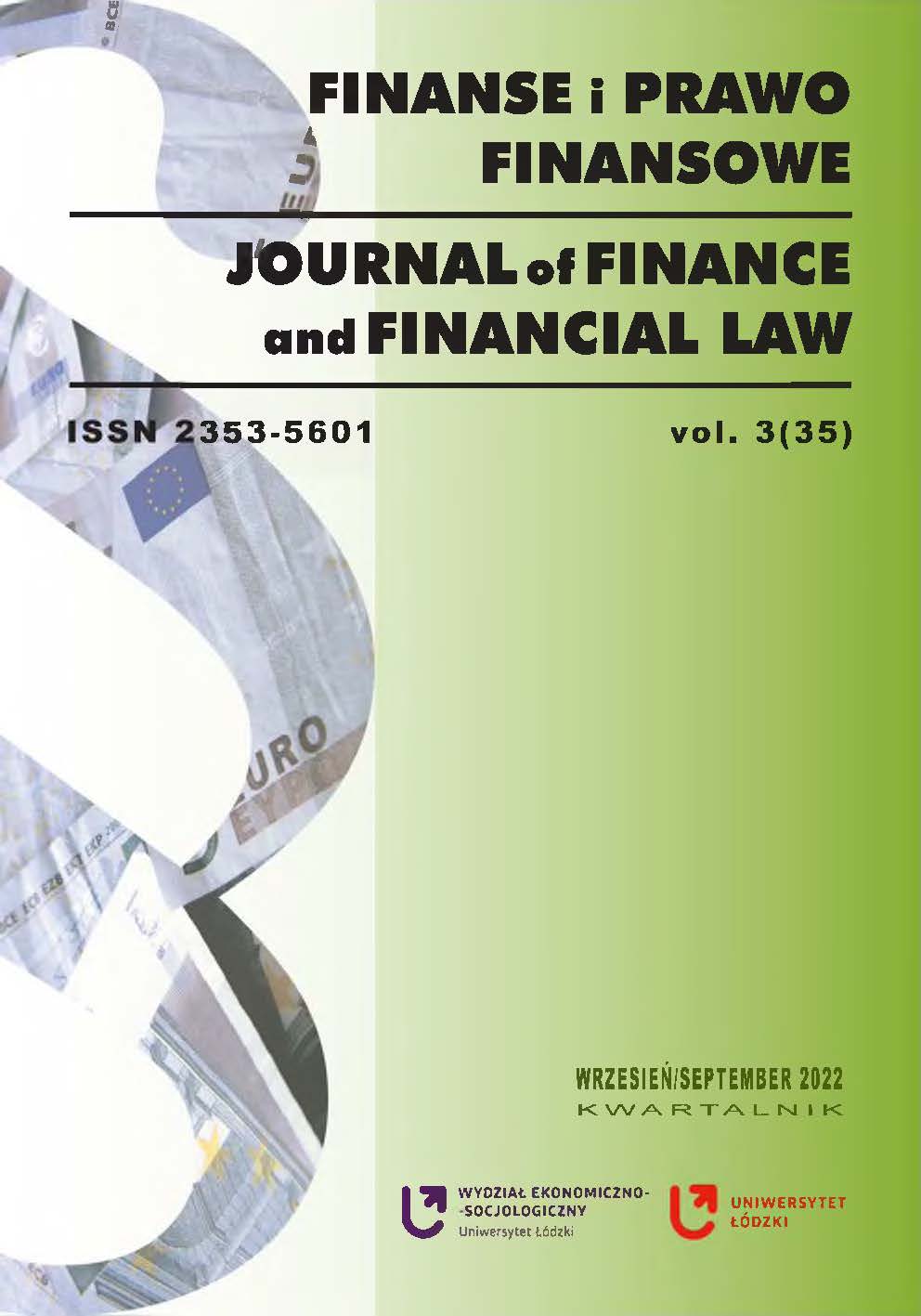Selected Cryptocurrency Returns and Capital Gains Tax - Based on the Example of Countries with Varying Degrees of Legal Regulations Concerning Cryptocurrencies
DOI:
https://doi.org/10.18778/2391-6478.3.35.04Keywords:
taxes, cryptocurrency, regulation, capital gains tax, bitcoin, ETCAbstract
The purpose of the article/hypothesis: The purpose of this article is to present the impact of capital gains tax on the returns of the two most popular cryptocurrencies: BITCOIN and Ethereum Classic (ETC).
Methodology: In this study, the rates of return on selected cryptocurrencies were proposed as a variable that may be affected by taxes on capital gains. The article presents a new approach to the analysis of issues related to cryptocurrencies.
Results of the research: The results show that for selected countries (Hungary, Italy, Poland, the USA) there is a correlation between the tax rate on capital gains and the return on ETC. In the case of BITCON, however, there is no such a relationship.
Downloads
References
Bollen R., 2013, The Legal Status of Online Currencies: Are Bitcoins the Future? „Journal of Banking and Finance Law and Practice”, pp. 38.
Google Scholar
Czarnecki J., 2018, Cryptocurrency a financial instrument? A new proposal in the EU https://newtech.law/en/cryptocurrency-a-financial-instrument-a-new-proposal-in-the-eu/ [Accessed 10.04.2021].
Google Scholar
Directive (EU) 2018/843 of the European Parliament and of the Council of 30 May 2018 amending Directive (EU) 2015/849 on the prevention of the use of the financial system for the purposes of money laundering or terrorist financing, and amending Directives 2009/138/EC and 2013/36/EU (Text with EEA relevance) https://eur-lex.europa.eu/legal-content/EN/TXT/?uri=celex%3A32018L0843 [Accessed 02.05.2021].
Google Scholar
Dobosz D., Niziołek A., 2019, Opodatkowanie kryptowalut w Polsce. „Studenckie Prace Prawnicze, Administratywistyczne i Ekonomiczne”, 28, pp. 275–286.
Google Scholar
DOI: https://doi.org/10.19195/1733-5779.28.20
ESMA 2019 https://www.esma.europa.eu/sites/default/files/library/esma71-99-1084_advice_on_crypto_assets.pdf [Accessed 22.06.2022].
Google Scholar
Giudici G., Milne A., Vinogradov D., 2020, Cryptocurrencies: market analysis and perspectives. „Journal of Industrial and Business Economics”, 47(1), pp. 1–18.
Google Scholar
DOI: https://doi.org/10.1007/s40812-019-00138-6
Haffke L., Fromberger M., Zimmermann P., 2020, Cryptocurrencies and anti-money laundering: the shortcomings of the fifth AML Directive (EU) and how to address them. „Journal of Banking Regulation”, 21(2), pp. 125–138.
Google Scholar
DOI: https://doi.org/10.1057/s41261-019-00101-4
Härdle W.K., Dautel A.J., Lessmann S., Seow H.V., 2020, Forex exchange rate forecasting using deep recurrent neural networks. „Digital Finance”, 2(1), pp. 69–96.
Google Scholar
DOI: https://doi.org/10.1007/s42521-020-00019-x
Houben R., Snyers A., 2020, Crypto-assets - Key developments, regulatory concerns and responses, „European Parliament Study” https://www.europarl.europa.eu/thinktank/en/document/IPOL_STU(2020)648779 [Accessed 08.03.2022]
Google Scholar
Karisma K., 2022, Comparative Review of the Regulatory Framework of Cryptocurrency in Selected Jurisdictions. „Regulatory Aspects of Artificial Intelligence on Blockchain”, pp. 82–111.
Google Scholar
DOI: https://doi.org/10.4018/978-1-7998-7927-5.ch005
Kowalski P., 2015, Taxing Bitcoin transactions under Polish tax law. „Comparative Economic Research”, 18(3), pp. 139–152.
Google Scholar
DOI: https://doi.org/10.1515/cer-2015-0025
Lener R., Furnari S.L., Lorenzotti N., Di Ciommo A., Lener R.A., 2021, The Virtual Currency Regulation Review: Italy, „Lener & Partners and Verteq Capital” https://thelawreviews.co.uk/title/the-virtual-currency-regulation-review/italy [Accessed 15.03.2022].
Google Scholar
Lyons T., 2018, EU Blockchain Observatory and Forum. In Workshop Report. „Government Services and Digital Identity”, Brussels.
Google Scholar
Nakamoto S., 2008, Re: Bitcoin P2P e-cash paper. „The Cryptography Mailing List”.
Google Scholar
OECD Data https://data.oecd.org/ [Accessed 12.01.2020].
Google Scholar
OECD, 2020, Taxing Virtual Currencies: An Overview Of Tax Treatments And Emerging Tax Policy Issues, „OECD”, Paris https://www.oecd.org/tax/tax-policy/taxing-virtual-currencies-an-overview-of-tax-treatments-and-emerging-tax-policy-issues.htm [Accessed 20.02.2022].
Google Scholar
Ossinger J., Hajric V., 2021, Crypto investors turn to lesser-known tokens after Bitcoin and Ether’s rallies https://fortune.com/2021/08/30/crypto-alternative-cardano-binance-coin-avalanche-bitcoin-ether-price-rally/ [Accessed 20.02.2022]
Google Scholar
Papadimitriou T., Gogas P., Gkatzoglou F., 2020, The evolution of the cryptocurrencies market: A complex networks approach. „Journal of Computational and Applied Mathematics”, 376, pp. 112831.
Google Scholar
DOI: https://doi.org/10.1016/j.cam.2020.112831
Przyluska-Schmitt J., 2021, Bitcoin – zagadnienia prawno-podatkowe. „Przegląd Prawno-Ekonomiczny”, (4), pp. 115–134. https://doi.org/10.31743/ppe.12731
Google Scholar
DOI: https://doi.org/10.31743/ppe.12731
Rainero C., Puddu L., Migliavacca A., Coda R., Modarelli G., 2019, “Bit Standard”- Bitcoin between reality and risks of a “halfway- money”. „African Journal of Busi-ness Management”, 13(7).
Google Scholar
DOI: https://doi.org/10.5897/AJBM2018.8724
Ramasastry A., 2014, Bitcoin: If You Can’t Ban It, Should You Regulate It? The Merits of Legalization, „Verdict Justia” https://verdict.justia.com/2014/02/25/bitcoin-cant-ban-regulate [Accessed 20.05.2021].
Google Scholar
Segendorf B., 2014, What is bitcoin. „Sveriges Riksbank Economic Review”, 2014:2, pp. 2–71.
Google Scholar
Sobiecki G., 2015, Regulowanie kryptowalut w Polsce i na świecie na przykładzie Bitcoina–status prawny i interpretacja ekonomiczna. „Problemy Zarządzania”, (3/2015 (54), t. 1), pp. 144–163.
Google Scholar
DOI: https://doi.org/10.7172/1644-9584.54.10
The Chainalysis, 2020, Crypto Crime Report https://go.chainalysis.com/2020-crypto-crime-report [Accessed 15.02.2021]
Google Scholar
Tu K.V., Meredith M.W., 2015, Rethinking virtual currency regulation in the bitcoin age. „Washington Law Review”, 90(1), pp. 271–347.
Google Scholar
Van Eecke P., Haie A.G. 2018, Blockchain and the GDPR: The EU Blockchain Observa-tory Report. “Eur. Data Prot. L. Rev”, 4, pp. 531.
Google Scholar
DOI: https://doi.org/10.21552/edpl/2018/4/18
Vaselli G., 2019, Italy’s tax treatment of cryptocurrencies: The risks and opportunities. „THE BLOCK Blockchain Technology News”. Available from https://www.blockchaintechnology-news.com/2019/04/italys-tax-treatment-of-cryptocurrencies-the-risks-and-opportunities/ [Accessed 11.02.2020].
Google Scholar
Verbeek M., 2012, A Guide to Modern Econometrics: KU Leuven and Tilburg University. https://thenigerianprofessionalaccountant.files.wordpress.com/2013/04/modern-econometrics.pdf [Accessed 12.01.2019].
Google Scholar
Wang Z., Jin H., Dai W., Choo K.K.R., Zou D., 2021, Ethereum smart contract security research: survey and future research opportunities. „Frontiers of Computer Science”, 15(2), pp. 1–18.
Google Scholar
DOI: https://doi.org/10.1007/s11704-020-9284-9
Włosik K., 2021, Rynek kryptowalut i tokenów z perspektywy inwestycyjnej, Wydawnictwo UEP.
Google Scholar
DOI: https://doi.org/10.18559/978-83-8211-081-4
Wooldridge J.M., 2005, Fixed-effects and related estimators for correlated random-coefficient and treatment-effect panel data models. „Review of Economics and Statis-tics”, 87(2), pp. 385–390.
Google Scholar
DOI: https://doi.org/10.1162/0034653053970320
World Bank Open Data - https://data.worldbank.org/ [Accessed 12.01.2020].
Google Scholar
Downloads
Published
How to Cite
Issue
Section
License

This work is licensed under a Creative Commons Attribution-NonCommercial-NoDerivatives 4.0 International License.














